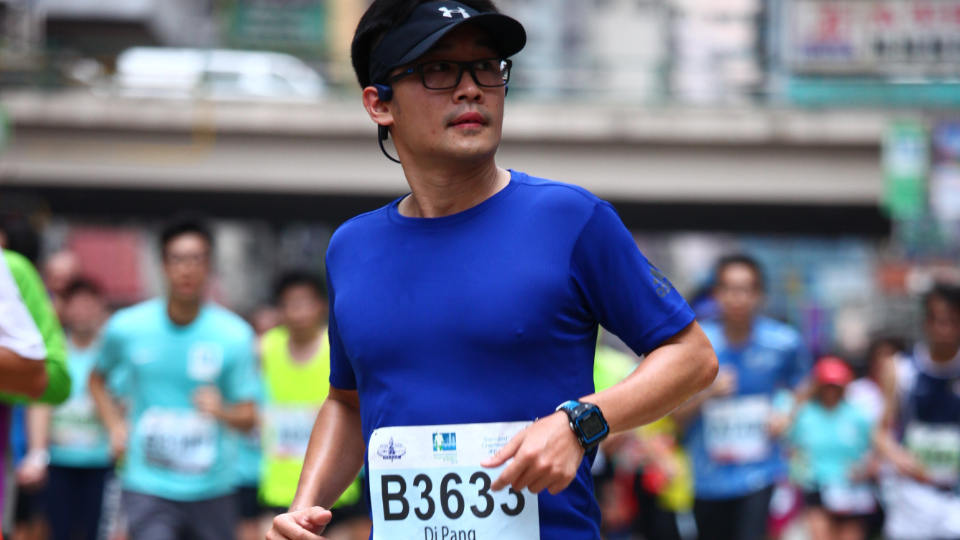When the sun goes down, it is time to lace up your favourite kicks, then snug your earphones in and get ready to run your best night run. Runners run in the night, whether they have a jam-packed schedule or are a night owl at heart.
What’s more exciting is that running at night makes you feel like you are speeding like a lightning strike without any distraction, especially when you run in high intensity motion. It gives you optimal high performance and a great way to de-stress after a long day at work.
We spoke to two runners who are love running at night to share their experiences on why they chose to run at night and how it kept them going.
1. Jerry Lam
Bio: Singaporean, 40 year-old, Business Development Manager

Jerry picked up running in 2007 mainly to lose weight. But he soon fell in love with the sport, as it is the one thing that he can do anywhere, anytime, with friends or alone. To keep training and running regularly, he initially kept signing up for races. But these days, running has become a habit to him; it just makes him feel good and happy.
RS: What motivates you to run during the night instead of day?
Jerry: I started to run regularly at night for very practical reasons. Firstly, I’m too occupied with work and family during the day. The best time for me to run is at night once all my work is settled, and my family is asleep. I’m more relaxed and have more time to myself. Secondly, running at night helps me to de-stress after a long day at work. Lastly, I’m not a morning person. I find it difficult waking up early to run and tend to snooze and go back to sleep once the alarm rings.
RS: Are there any differences between running at night and the day?
Jerry: Running at night is better, in my opinion. First of all, my body is still awake, and it’s easier to get into motion compared to running too early in the morning when the body is cold. Secondly, it’s definitely cooler to run at night without the sun. And because of this, I can run faster, too. And as I usually run after 10 p.m., it is more efficient in terms of burning away the calories from all the meals I’ve had earlier.
RS: What are the pros and cons of training at night?
Jerry: Here are the pros:
- It’s cooler without the heat from the sun.
- Park connectors are less crowded with leisure joggers and casual walkers, so I don’t need to keep weaving in and out of my path.
- It’s more peaceful and quieter at night, allowing me to immerse more deeply in my thoughts and enjoy the moment.
- More focus on form, pace and rhythm, as there’s fewer distractions from the scenery.
- Heightened my senses, as I’m more aware and alert of my surroundings to ensure that I’m always safe.
- Help me sleep better at night, as I get tired after a run.
Here are cons:
- While it is cooler at night, it’s usually more humid.
- Bikes and e-scooters tend to zoom past very fast along park connectors at night.
- Certain parks or routes are not well lit, which might be dangerous.
RS: From your experience, what are the things to take note of when running at night?
Jerry: Here are the things to take note:
- Wear brightly coloured or reflective running gear so that you can be seen from afar and can be spotted easier in the dark.
- Try to avoid places that are too dark or not well lit.
- Always bring a phone along for emergencies.
- Notify your family members that you’re going out for a night run and let them know your route.
- If you’re running a new route for the first time at night, ensure that you’ve surveyed the route before in the day so that you’re aware of potential hazards along the route.
- If you’re running an unfamiliar route at night, try not to run alone.
- If you’re running with music, try not to turn up the music too loud so that you can still hear your surroundings.
- Plan your route so that you’ll know where are the nearest amenities, rain shelters, toilets, water points at any point.
You can follow Jerry on Instagram: @eat_run_jerry80
2. Kelvin Seow
Bio: Singaporean, 43 year-old, Homemaker, Freelance Florist

Kelvin started to take up running more seriously around 12 years ago when he wanted to get a better timing for the running part of the annual IPPT (Individual Physical Proficiency Test). From there, it progressed to taking up races, including marathons and finally, he did an ultra-distance just last month. In recent years, due to work commitments, he has taken part in less races, but he still gets motivated to run through online virtual challenges.
RS: What motivates you to run during the night instead of day?
Kelvin: I can’t get up early enough in the morning to run the distance I want and have sufficient time to recover before heading out to work.
RS: Are there any differences between running at night and the day?
Kelvin: Compared to running during the day, visibility is reduced at night, so safety becomes an issue.
RS: What are the pros and cons of training at night?
Kelvin: The pros are:
- Muscles and joints tend to be more stiff and tense in the morning, but at night, the body is already warmed up and ready to go. So, running at night places you at a lower risk of injury.
- After all the running, you get to sleep and rest. Sometimes, after a hard session, you wake up the next morning feeling refreshed. On the other hand, a morning run may leave you feeling lethargic throughout the day.
The cons are:
- Get to breathe in fresher air with higher oxygen content if you run during the day.
- Sometimes, I am too tired and lack motivation after a hard day’s work to be able to start running.
- It may be difficult to fall asleep as the body is re-energized after the workout.
RS: From your experience, what are the things to take note of when running at night?
Kelvin: I run around the CBD, and the area is quite well lit. But it is good to wear reflective running gear so that motorists or cyclists passing by can see you. For safety issues, avoid poorly lit areas, unpopulated places or deserted streets. If instinct tells you not to go down a certain street, then change course.
If you really need to move onto the road to avoid poorly lit paths, make sure to face the oncoming traffic so that you can react to approaching vehicles. Avoid using headphones. I don’t listen to music, and I think it helps as you are aware of the surroundings, whether there are any motorists or cyclists approaching. If you need to listen to music, you probably need to lower the volume.
Do you prefer to run at night or in the day? Let us know in the comments.
Meanwhile, we would like to invite you to run the World Cities Online Night Marathon Series at Spacebib to explore the night view around the world.





